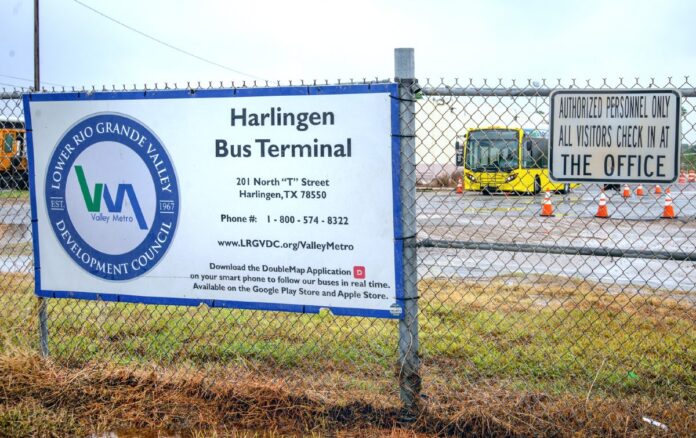HARLINGEN — The money’s getting locked in.
Yesterday, city commissioners committed the city to helping fund a $5 million project to build a public transit center planned as a hub for buses off Interstate 69.
So far, commissioners have approved the $291,000 purchase of the old Cameron County Precinct 4 warehouse site at 201 N. T St., which has served as Valley Metro’s makeshift hub since March 2018.
As part of the project, the Federal Transit Administration has earmarked about $5.6 million to build the transit center to serve as Valley Metro’s northern Cameron County hub, Tom Logan, the bus line’s director, said earlier this week.
Under a program, the agency offers federal dollars to help fund public transportation in rural areas, Joel Garza, the city’s special projects director, said during an interview.
Meanwhile, he said, the agency requires the city to match 20 percent of the project cost.
Now, City Manager Dan Serna is requesting the agency consider the city’s land purchase as fulfillment of its requirement to match the federal money.
“We’re going to utilize the property we acquired as our match,” Serna told commissioners.
During the meeting, commissioners authorized Serna to sign a letter of commitment requesting the Federal Transit Administration consider the city’s land purchase as fulfillment of the match requirement.
“The city guarantees that the land will be available as part of the city’s contribution for the construction of a multi-modal terminal,” Serna wrote to Ron Garza, executive director of the Lower Rio Grande Valley Development Council, which has been working to land the project’s federal funding.
In his letter, Serna wrote city officials would also oversee the construction project’s management.
“In addition, the city is also committed to assisting in the local contribution of operating and maintaining the facility,” Serna wrote.
Transit center’s design
Meanwhile, officials continue to work on the facility’s design.
“We’re working with the city very closely in the design and services,” Logan said during an interview.
Officials are reviewing transit centers in Brownsville, McAllen and Edinburg to design the facility to include a terminal featuring a ticket office, waiting area and restaurants along with as many as 10 bus bays, Logan said.
The 12-month construction project, he said, is expected to begin in about a year.
For about three years, officials here have planned the project ranked as a top priority in the city’s 2016 master plan.
“It provides a facility for modes of transportation that can be utilized by those who need public transportation,” Serna said before yesterday’s meeting.
Site selection
In part, the project stems from Valley Metro’s growing popularity as the Rio Grande Valley’s first big step toward public transportation.
Meanwhile, the city lacked a facility to serve as a hub for bus lines bound for stops in the United States and Mexico.
For about two years, officials searched for a two-acre site with easy access to I-69 and Interstate 2 as well as the city’s main streets.
In May, commissioners approved the purchase of the site off North T Street.
“It brings different modes of public transportation to one location that’s convenient and accessible and it’s going to help folks traveling to and from our city,” Serna said during an interview.
Regional hub
Officials are counting on the transit center to help transform area transportation.
For decades, Valley Transit Co.’s station has served as the city’s bus center at 215 East Monroe Ave.
Meanwhile, residents have boarded buses bound for stops in the United States and Mexico outside a Stripes convenience store on Tyler Avenue near the Interstate 69 interchange.
Officials plan to develop the terminal into a regional hub.
Around the transit center, restaurants and retail shops are expected to open.
Inside the terminal, customers could buy tickets to board buses operated by Valley Metro and such companies as Valley Transit Co. and Greyhound.
Some companies such as Adame, Tornado and El Expreso might offer service into Mexico.
For Valley Metro, the transit center could also spur expanded service.
As part of the project, city officials plan to rent space in the terminal to fund the center’s operating costs.
Plans include renting space to bus companies and businesses such as fast-food restaurants and retail shops.
In Brownsville and McAllen, restaurants and retail businesses have opened in and around transit centers there.





